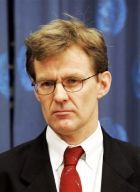UN official paints grim picture of Darfur prospects
Mar 13, 2006 (UNITED NATIONS) — An upsurge in violence and insecurity has left hundreds of thousands of civilians in Sudan’s conflict-wracked Darfur region without food and facing the prospect of widespread disease and massive deaths within a few weeks, the U.N. humanitarian chief said.
 Jan Egeland said Monday he fears that Darfur is returning to “the abyss” of early 2004 when the region was “the killing fields of this world.” In mid-2004 the world woke up to the killings and the U.N. finally gained access to Darfur, launching one of its largest humanitarian operations ever, which saved many lives, he said at a briefing for two reporters.
Jan Egeland said Monday he fears that Darfur is returning to “the abyss” of early 2004 when the region was “the killing fields of this world.” In mid-2004 the world woke up to the killings and the U.N. finally gained access to Darfur, launching one of its largest humanitarian operations ever, which saved many lives, he said at a briefing for two reporters.
But “2006 seems to be bringing us back to 2004,” Egeland warned. “At the moment, we are rapidly, unfortunately, losing ground in Darfur. We’re losing ground every day in the humanitarian operation which is the lifeline for more than 3 million people.”
The primary reason, he said, is the growing insecurity for tens of thousands of civilians and the 14,000 unarmed humanitarian workers who are facing increasing violence from Arab militias known as the Janjaweed, rebels, government forces and bandits, he said.
As a result, Egeland said, U.N. relief officials and their partner relief organizations cannot reach more than 300,000 people on the Chad border in western Darfur and the central mountainous region of Jebal Marra because they are too dangerous.
These unreachable areas, he said, “will soon get massively increased mortality because there is nothing else but international assistance” and once food supplies run out malnutrition and disease will increase leading to starvation.
“It’s not happening in a day or two, or a week or two, but it will happen within (a) few weeks we will see that,” Egeland said.
There are also pockets in western, southern and northern Darfur which can be reached only intermittently, he said.
“This is a moment of truth for international compassion in this new millennium,” Egeland said. “It’s a moment of truth because Darfur has become a symbol of how this generation will deal with people hanging on by their fingernails to avoid to fall into the abyss.”
“It’s a test case for the world for having no more Rwandas and no more massive loss of innocent lives,” he said.
At least 180,000 people have died – some estimates are far higher – and some 2 million have been displaced since the start of a 2003 revolt by rebels from Darfur’s ethnic African population. The Arab-dominated Sudanese government is alleged to have responded to the revolt by unleashing Arab militias, who carried out sweeping atrocities against ethnic African villagers.
Egeland said the situation is not hopeless and the cycle of violence could be broken immediately if the government and rebels agree to a cease-fire proposal put on the table Sunday by African Union mediators at peace talks in Abuja, Nigeria.
“We need to have now an incredible pressure on the parties who are procrastinating at the negotiating table,” he said.
The world must also not forget the 3 million people who need food, water and health services in Darfur – and 3 million others in southern Sudan and elsewhere in the country who need humanitarian relief, Egeland said.
Donors have provided only 21% of the $1.7 billion the U.N. sought for Sudan this year, including about $650 million for Darfur. The U.N. children’s agency, UNICEF, for example has received just $2 million of the $90 million it needs in Darfur, he said.
Equally important, Egeland said, is security.
“We do not have security, neither for the civilian population nor for our humanitarian workers,” he said.
“That is why there are tens of thousands of new displacements, both in Darfur and on the other side of border in Chad,” Egeland said. “And there are attacks against humanitarian workers every week, again and again. Our colleagues are being hijacked, harassed, kidnapped. Our cars are being looted and it’s become routine – and it is an outrage.”
(ST/AP)
